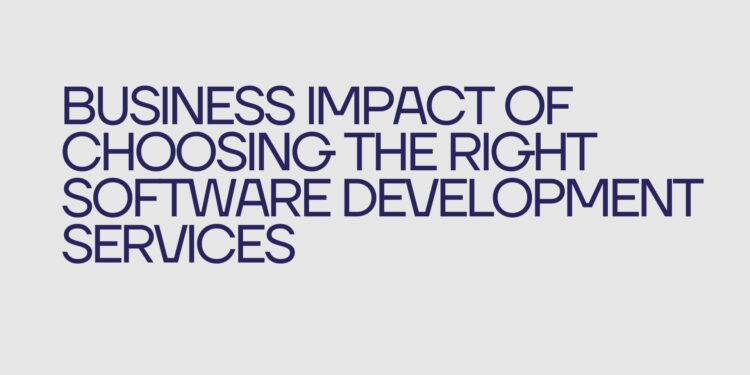In an era where digital tools influence nearly every aspect of a business—from operations and logistics to customer experience and sales—choosing the right software solution isn’t just a technical decision. It’s a business one.
Yet, many companies still struggle with outdated systems, disjointed apps, or off-the-shelf platforms that don’t fit their actual needs. The result? Wasted time, poor user experiences, and missed growth opportunities.
This is where software development services become a powerful asset. Not just for building apps or websites, but for designing intelligent, scalable, and purpose-driven solutions that align with your business goals. But how do these services actually impact your business outcomes? And how do you choose the right partner for your journey?
Let’s explore.
What Are Software Development Services?
Software development services refer to the full spectrum of processes involved in creating, customizing, deploying, and maintaining software applications. These services can include:
- Custom software development
- Web and mobile app development
- Software integration and modernization
- Cloud-based solutions
- Maintenance, support, and scaling
The purpose of these services is not just to build a product but to solve a problem—efficiently, securely, and in a way that supports long-term business goals.
Why the Right Software Partner Matters
1. Aligning Technology With Business Goals
A generic software solution may work for some, but most businesses have unique workflows, data requirements, and customer needs. Choosing a development team that understands your goals ensures that every feature built is purposeful, not just decorative.
Custom-built platforms can improve productivity, reduce redundancies, and give your teams exactly what they need—nothing more, nothing less.
2. Improved Operational Efficiency
The right software can eliminate bottlenecks across departments. Think about automated invoicing, seamless inventory tracking, or real-time dashboards for performance metrics. These aren’t luxuries—they’re efficiency multipliers that save time and reduce errors.
With the right development partner, software becomes an enabler of growth rather than a source of friction.
3. Scalability and Long-Term Flexibility
Businesses evolve. What works today might not meet your needs in two years. The right software development approach focuses on scalability—ensuring your system can grow with your business without the need for a total rebuild.
Modular design, cloud-native architecture, and API-ready systems ensure you can plug into new tools or markets when needed.
4. Enhanced Customer Experience
In many industries, your software is the face of your business. Whether it’s a customer-facing app, a support portal, or an e-commerce platform—user experience matters.
Reliable, responsive, and intuitive digital products drive customer satisfaction and brand loyalty. The right software team will help you craft interfaces that are as functional as they are delightful.
5. Faster Time to Market
Speed matters. If you have an idea or need to pivot quickly, working with an experienced software team can dramatically reduce development cycles.
Agile processes, collaborative design, and experience with rapid prototyping ensure you’re not stuck in endless planning meetings while competitors are already in market.
6. Security and Compliance
In a world where data breaches and cyber threats are daily news, security can’t be an afterthought. Good software development services prioritize secure code, data protection, and regulatory compliance from the very beginning—especially important in industries like healthcare, finance, and logistics.
7. Cost Optimization (Not Just Cost Saving)
While outsourcing software development can save money, the real value lies in cost optimization. That means getting the right features, avoiding expensive reworks, and maximizing your ROI over the product’s entire lifecycle.
The right development partner will help you prioritize features, reduce unnecessary complexity, and build software that adds measurable business value.
How to Choose the Right Software Development Services
Choosing the right partner can feel overwhelming. Here’s what to consider:
- Experience in your industry
- Ability to understand and challenge your business needs
- Proven development process (Agile, DevOps, etc.)
- Security and compliance standards
- Post-launch support and maintenance
- Clear communication and collaboration tools
Remember, you’re not just hiring coders—you’re partnering with problem solvers.
Real-World Impact: What the Right Choice Can Deliver
Companies that invest in tailored software development often report:
- Increased revenue through better digital experiences
- Lower operating costs from automation and system integration
- Higher employee satisfaction with improved tools
- Faster innovation cycles and time-to-market
It’s not about building software for the sake of it. It’s about creating systems that work for you—and keep working as you grow.
Conclusion
Technology should empower your business, not slow it down. The right software development services do more than deliver code; they deliver confidence, clarity, and the capability to compete at your best.
If you’re planning to modernize, scale, or build something entirely new, the decision isn’t just about hiring a developer. It’s about choosing a strategic partner who understands how your technology can drive your business forward.
FAQs: Software Development Services
1. What’s the difference between custom software development and off-the-shelf solutions?
Custom software is built specifically for your business needs, while off-the-shelf software is a general solution available to anyone. Custom offers better alignment, but off-the-shelf can be faster and cheaper upfront.
2. How long does it take to build a custom software application?
Timelines vary depending on complexity. A basic app may take 2–3 months, while an enterprise platform could take 6–12 months. Agile development often allows for quicker MVPs and iterative improvement.
3. Are software development services only for large enterprises?
Not at all. Many small and mid-sized businesses use these services to automate tasks, improve customer experiences, or build scalable platforms as they grow.
4. What’s included in ongoing software maintenance?
Maintenance may include bug fixes, updates, performance improvements, and security patches. Some providers also offer 24/7 support and scalability upgrades.
5. How do I know if I need custom software?
If you’re struggling with disjointed tools, manual processes, or systems that don’t match your workflows, custom software can be a more efficient and long-term solution.












